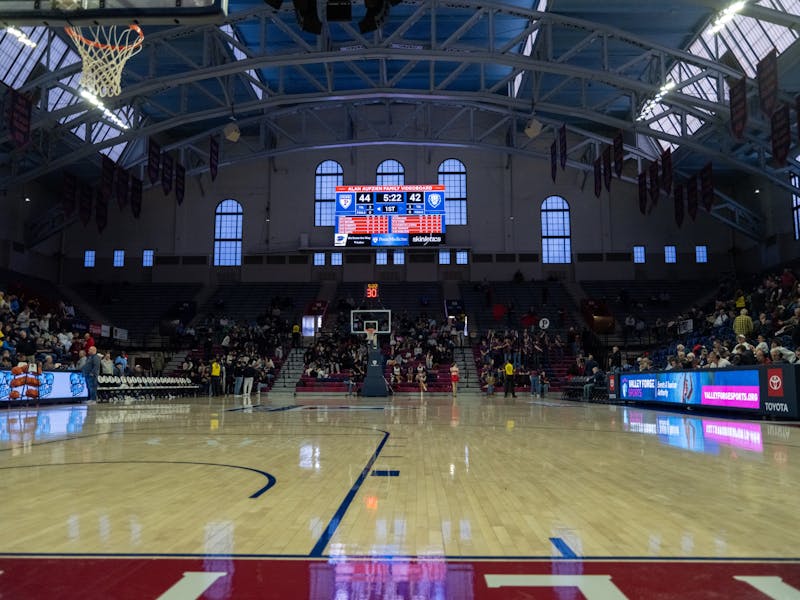Before this season began, Penn men's basketball coach Fran Dunphy walked into Hutchinson Gymnasium to talk to the 200-some-odd diehard student fans who were camping out for season tickets in the Line. Dunphy voiced his gratitude for the show of support and expressed a sentiment that I -- as a reporter -- heard throughout the early portion of this year's schedule. "I'd ask that you be patient with us," Dunphy said. He knew that his team was young and unproven. Dunphy was pretty sure that his charges weren't going to come out of the gate looking just like his two previous teams, which had gone a combined 27-1 in Ivy League play. And, sure enough, they started slow, losing their first eight. Throughout the first 21 games of 2000-2001, Penn fans waited with baited breath for the Quakers to shift into gear, to finally become the team that will capture another Ivy crown. Perhaps the fans thought that last night's game against Princeton would mark the turning point for Penn. Perhaps they thought that the "real" Quakers would emerge on the Palestra hardwood. Unfortunately for the Penn faithful, last night's ugly 67-53 loss to Princeton was yet another indication that this is still not a team that can overpower the Ivy League. "We're still not exactly sure of who we are," Dunphy said after last night's loss. If the Quakers are a winning team at heart, it's about time that they start to prove it. If they are still having an identity crisis, it's about the time of year where they need to resolve it. I think that Penn has the weapons to win out, but there's no time to waste. There were moments last night when it looked as if the Quakers were about to turn the corner, but they never did. With 4:11 showing on the Palestra scoreboard, Koko Archibong calmly sunk a pair of free throws after being fouled on the other end of the court by the Tigers' Konrad Wysocki. The Quakers were in the double bonus, and Archibing's freebies had cut the Princeton lead to six points (43-37) for the first time since there were 12 minutes left in the first half. The crowd erupted, and the Palestra became the acoustic crucible that it always has the ability to be. The crowd stayed thunderous throughout Princeton's ensuing possession until Ahmed El-Nokali drove and sunk a layup with 3:40 left to go. Penn would never get the lead down to six again. Penn did a generally admirable job on the defensive end. Yes, the Quakers were outrebounded on the defensive glass, 28-20. But they held the Orange and Black -- who were hitting 51.8 percent of their field goals against the Ivy League before last night -- to 39.6 percent shooting from the field. Sure, Princeton had many more good looks from behind the three-point arc than Dunphy and his staff might have liked, but it's undeniable that the real problems for the Quakers last night were on offense. Penn only shot 34.0 percent on the night, but that number masks just how poorly the Quakers backcourt shot. Together, Penn starting guards David Klatsky and Lamar Plummer shot 3-for-18 from the field (16.7 percent), 1-for-10 from three-point territory (10 percent) and 0-for-4 from the free-throw line. "[Penn] just missed shots," Princeton coach John Thompson III said. "They got open looks, but they just didn't go in." In addition to shooting poorly, the Quakers truly looked out of sorts on offense throughout much of the night. Penn center Geoff Owens' 15 points came mostly from deft play down low, but Penn couldn't find a way to get the ball into the low post enough to keep up with the Tigers. When the Red and Blue seemed like they had an offensive spark early on in the second half, it was due largely to aggressive dribble penetration. This gave Penn fans reason to be hopeful, but it doesn't make the Quakers into a good offensive team. Right now, Penn is in virtually the same position in which it found itself two years ago after a heartbreaking loss to Princeton at the Palestra. If they finish strong, they can still make the Tournament, but there is one major difference between last night's loss and collapse that the Quakers had in 1999. While the first half that Penn played in the 1999 game was indicative of what was best about that Quakers team -- the fist pumping of Paul Romanczuk, the smart play of Michael Jordan, etc. -- nothing in last night's loss was quintessential Penn basketball. All one saw was the inconsistency that has typified the play of the Red and Blue all season.
The Daily Pennsylvanian is an independent, student-run newspaper. Please consider making a donation to support the coverage that shapes the University. Your generosity ensures a future of strong journalism at Penn.
DonatePlease note All comments are eligible for publication in The Daily Pennsylvanian.








